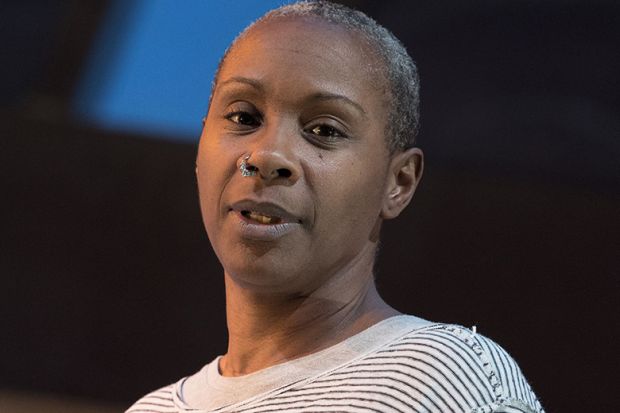Taking on unexpected roles is nothing new for Josette Bushell-Mingo; one of the first black actresses to join the Royal Shakespeare Company, she has played Cleopatra, Juliet, Nina Simone and even Elvis Presley on stage, as well as the wise mandrill Rafiki in the inaugural West End run of The Lion King.
But the 58-year-old’s latest job is arguably her most surprising part to date. “I’ve had a career where people often think ‘How’s that possible?’ and maybe I’m doing that now,” she reflected on becoming principal of the Royal Central School of Speech and Drama, University of London, whose alumni – including Judi Dench, Laurence Olivier, Andrew Garfield and Martin Freeman – are a who’s who of British acting talent.
Challenging notions about what parts she should play has not been without controversy. When she took over the lead part of Silvia vacated by Saskia Reeves in the RSC’s Two Gentlemen of Verona in 1991, opposite Hugh Bonneville, there were some murmurs of disapproval from critics. “Some good friends from the RSC – Hugh, Saskia, Toby Stephens, Owen Teale – were very conscious and supportive of what we were doing on diversity, but I don’t think we were prepared for what happened,” she recalled. “There were definitely times when I thought ‘why?’ and ‘what has this got to do with the part?’.”
That experience with the RSC, however, showed how theatre can be a uniquely powerful vehicle to challenge and explore issues that go way beyond the auditorium.
“These are tough questions we face, and arts institutions are ideally placed to ask them,” said Ms Bushell-Mingo. Recalling her Olivier-nominated turn as Rafiki – the first non-South African to play the originally male role – she doesn’t talk about the thrill, or terror, of playing to 2,000 people at the Lyceum every night, but the conversations she subsequently had about whether the blockbuster show somehow heralded the start of a new wave of black British theatre.
“Those questions about me being a black actor led others to talk about being a black doctor, a black lawyer, and that lead to Push,” she explained of the black arts festival she founded at the Young Vic in 2001.
“These productions gave me an extraordinary way into research and tackling gaps in our knowledge that I’d never considered.”
Exploring these questions about how theatre interacts with British society will be central to Ms Bushell-Mingo’s work at Central, defying any notion that the London-born actress who passed up a university place to join the Kaboodle touring theatre straight from school will not be driving forward the school’s research – rated fourth strongest in the 2021 Research Excellence Framework for performing arts.
“The reason I said yes to this job is because Central is one of the most provocative arts complexes in the world,” she explained in her first interview since taking office in late 2021.
Those who imagine the Hampstead-based drama school is inhabited largely by a handful of young actors practising their next Shakespearean soliloquy are profoundly mistaken, she said.
“Central is one of the most dynamic and interesting institutions at the forefront of training in this country but people sometimes misunderstand the breadth of what we do as a community – we have renowned performance courses such as acting and musical theatre of course, but we also offer training in costume construction, sound production and prop making, in drama therapy and theatre criticism, and in applied theatre work for young people, as well as our civic work bringing drama into hospitals, prisons, and beyond,” explained Ms Bushell-Mingo.
“It’s almost like a Bauhaus,” reflected the former head of drama at Stockholm University of the Arts on the level of technical expertise mixed with artistic talent.
Maintaining this vibrant mix of training, research and outreach is an expensive business, even if drama schools are among those few institutions to still receive substantial additional funding for their high-cost programmes. Even with £6 million in grant funding, Central faces significant financial challenges as rising costs begin to bite, said Ms Bushell-Mingo. “The idea that conservatoires are protected is not true,” she said.
Ms Bushell-Mingo, the daughter of a London bus driver and nurse, was more alarmed about the erosion of the arts and drama education in primary and secondary schools that helped her step into a theatre company aged 18.
“The idea that I would become an actor was a strange one, but the arts found me and gave me the skills I needed, as an actor, but also to deal with the world as I found it,” she said. “I went to summer schools and after-school classes but I’m not sure that is really there now.”
Recent jobs cuts to arts courses at the universities of Wolverhampton and Roehampton are also “heart-breaking” given the enormous role these arts training centres played in their regions, she said. “We have a government which is systematically removing arts funding in favour of STEM subjects – that is an unforgivable situation, both for us and our STEM colleagues,” she said.
Telling the story of Central and other arts education institutions that are changing lives and communities for the better is a key priority for Ms Bushell-Mingo, who warned that the damage done to similar institutions cannot be easily fixed.
“The idea that we can continually shift finance away from these complex and brilliant centres cannot continue – it will not just harm institutions but our ability to think about ourselves and tackle the biggest issues in society.”
POSTSCRIPT:
Print headline: Arts institutions ‘ideally placed to ask society’s tough questions’
Register to continue
Why register?
- Registration is free and only takes a moment
- Once registered, you can read 3 articles a month
- Sign up for our newsletter
Subscribe
Or subscribe for unlimited access to:
- Unlimited access to news, views, insights & reviews
- Digital editions
- Digital access to THE’s university and college rankings analysis
Already registered or a current subscriber? Login








